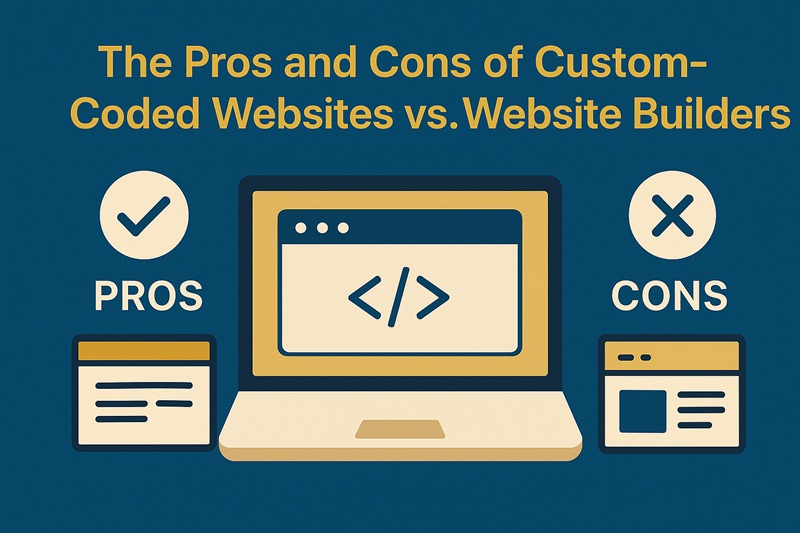When it comes to building a website, businesses and individuals often face a crucial decision: should they invest in a custom-coded website or use a website builder? Both options have their advantages and drawbacks, and the right choice depends on factors like budget, timeline, functionality, and long-term goals. In this article, we’ll explore the pros and cons of custom-coded websites and website builders to help you make an informed decision.
What is a Custom-Coded Website?
A custom-coded website is built from scratch using programming languages such as HTML, CSS, JavaScript, or frameworks like Laravel, React, or Django. These websites are often created by professional developers and are tailored to meet specific business needs.
Pros of Custom-Coded Websites
- Unlimited Flexibility: You have complete control over design, features, and functionality without the limitations of pre-built templates.
- Scalability: Custom-coded websites can grow with your business, handling advanced features like APIs, third-party integrations, or e-commerce platforms.
- Performance Optimization: Developers can optimize code for faster loading times, improved SEO, and better user experience.
- Unique Branding: Since everything is built from scratch, your website will stand out from competitors using similar templates.
Cons of Custom-Coded Websites
- Higher Cost: Hiring developers or agencies can be expensive compared to DIY website builders.
- Longer Development Time: Creating a website from scratch takes more time than using ready-made templates.
- Maintenance Required: Regular updates, bug fixes, and security patches are necessary to keep the site running smoothly.
- Technical Expertise: Without coding knowledge, you’ll rely heavily on developers for changes and updates.
What is a Website Builder?
A website builder is a platform like Wix, Squarespace, Shopify, or WordPress.com that allows users to create websites quickly using drag-and-drop tools, templates, and built-in features.
Pros of Website Builders
- Cost-Effective: Most builders offer affordable monthly plans suitable for startups and small businesses.
- Ease of Use: No coding knowledge is required. Drag-and-drop editors make website creation accessible to anyone.
- Quick Setup: A professional-looking website can be launched in a matter of hours.
- Built-in Features: Many builders include hosting, templates, SEO tools, and customer support in one package.
Cons of Website Builders
- Limited Customization: You’re restricted to the templates and functionalities the platform provides.
- Scalability Issues: As your business grows, the builder may not support advanced features or custom integrations.
- Performance Concerns: Websites built on shared servers may experience slower loading times.
- Platform Dependency: You are tied to the builder’s ecosystem, making migration to another platform difficult.
Which Option is Right for You?
The choice between a custom-coded website and a website builder depends on your goals:
- If you need full control, scalability, and unique branding, a custom-coded website is the best choice.
- If you want to launch quickly, save costs, and manage your site without technical skills, a website builder is ideal.
Final Thoughts
Both custom-coded websites and website builders have their place in the digital world. A startup or small business may benefit from the affordability and speed of website builders, while enterprises or companies with complex needs may prefer the flexibility and scalability of custom-coded solutions. Ultimately, the decision should align with your budget, resources, and long-term vision for your online presence.





